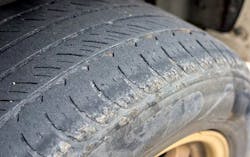Over the last couple of years I have written about the ongoing campaign in the United Kingdom tire sector to place a total ban on aging tires, and in particular those over 10 years old fitted to buses and coaches. The campaign has been at least partially successful.
At the end of June the UK government announced it is now consulting on plans to specifically ban tires more than 10 years old not for just buses and coaches, but also for trucks and minibuses. A new law confirming the ban could be introduced by the end of this year and come into force in early 2020.
UK Road Safety Minister Michael Ellis has stated that the government’s priority is to keep people safe on UK roads, which is why they are taking action that they believe will effectively reduce fatalities in all types of commercial vehicles. The official consultation in association with the Driver and Vehicle Standards Agency (DVSA) and The Department of Transport (DOT) will run for 10 weeks and will look at the merits of banning tires older than 10 years on all public service vehicles and trucks, with an additional consideration of extending the ruling to taxicabs and private hire vehicles.
Already the DVSA updated its Guidance recommendations on maintaining road worthiness to advise that tires aged 10 years and older should not be fitted on the front axles of heavy goods vehicles, buses and coac hes. This is in response to increasing evidence following research commissioned by the Department for Transport that shows aging tires suffer corrosion, which could cause them to fail.
The whole tire market in the UK and Europe is behind this new ruling, apart from part-worn tire dealers.
And that brings up the issue of part-worn tires. By part-worn tires I mean those that are considered unsafe when inspected. Selling these tires, which is a totally illegal practice, is a growing trend over here, I’m afraid. The subject has been debated and challenged by numerous tire safety organizations across Europe.I have covered this worrying problem several times in previous European Notebook columns, but just recently organizations around Europe have appeared to step up their ongoing campaigns to try once again to prevent unsafe part-worn tires from being sold by independent and unregistered part-worn tire dealers. That includes tire safety organizations in Europe and the UK such as the European Road Safety’s Tyre Aware campaign, European Tyre & Rubber Manufacturers Association (ETRMA), European Tyre Recycling Association (ETRA), TyreSafe and the National Tyre Distributors Association (NTDA).
There have been 18 tire safety investigations carried out across Europe and the UK during the last 12 months that have openly targeted 68 part-worn tire outlets. The result was a staggering 75% of the tires seized for inspection proved to be “dangerous” and unfit for sale.Another undercover investigation carried out several months ago by TyreSafe and the UK Trading Standards Association revealed that 99% of the companies they looked at were guilty of selling dangerous car tires, as all but one of the retailers that were visited (unannounced, I might add) sold illegal tires that contravened the legislation governing their legitimate sale.
The main problem is that although these investigations are continually taking place and reported on in the European media via trade magazines and the internet, in many cases the average motorists never get to see them. To be honest, even if they did, in most cases the message would be conveniently ignored, because like I am sure in most other parts of the world, tires are considered to be a “distress purchase,” and drivers often are only prepared to pay the very least they have to for a replacement tire.
The situation in Europe is particularly worrying at this time of the year as the summer months start to come to an end and Europe prepares itself for the winter months ahead. ■



